
Cecil Blount DeMille was an American filmmaker and actor. Between 1914 and 1958, he made 70 features, both silent and sound films. He is acknowledged as a founding father of American cinema and the most commercially successful producer-director in film history. His films were distinguished by their epic scale and by his cinematic showmanship. His silent films included social dramas, comedies, Westerns, farces, morality plays, and historical pageants. He was an active Freemason and member of Prince of Orange Lodge #16 in New York City.

The 60s decade ran from January 1, AD 60, to December 31, AD 69.
Ofonius Tigellinus was a prefect of the Roman imperial bodyguard, known as the Praetorian Guard, from 62 until 68, during the reign of emperor Nero. Tigellinus gained imperial favour through his acquaintance with Nero's mother Agrippina the Younger, and was appointed prefect upon the death of his predecessor Sextus Afranius Burrus, a position Tigellinus held first with Faenius Rufus and then Nymphidius Sabinus.

Quo Vadis is a 1951 American religious epic film set in ancient Rome during the final years of Emperor Nero's reign, based on the 1896 novel of the same title by Polish Nobel Laureate author Henryk Sienkiewicz. Produced by Metro-Goldwyn-Mayer and filmed in Technicolor, it was directed by Mervyn LeRoy from a screenplay by S. N. Behrman, Sonya Levien, and John Lee Mahin. It is the fourth screen adaptation of Sienkiewicz's novel. The film stars Robert Taylor, Deborah Kerr, Leo Genn, and Peter Ustinov, and features Patricia Laffan, Finlay Currie, Abraham Sofaer, Marina Berti, Buddy Baer, and Felix Aylmer. Future Italian stars Sophia Loren and Bud Spencer appeared as uncredited extras. The score is by Miklós Rózsa and the cinematography by Robert Surtees and William V. Skall. The film was released by Metro-Goldwyn-Mayer on November 2, 1951.
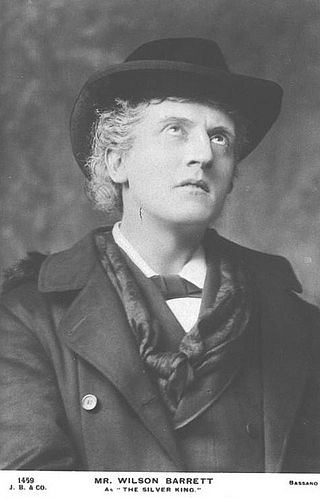
Wilson Barrett was an English manager, actor, and playwright. With his company, Barrett is credited with attracting the largest crowds of English theatregoers ever because of his success with melodrama, an instance being his production of The Silver King (1882) at the Princess's Theatre of London. The historical tragedy The Sign of the Cross (1895) was Barrett's most successful play, both in England and in the United States.
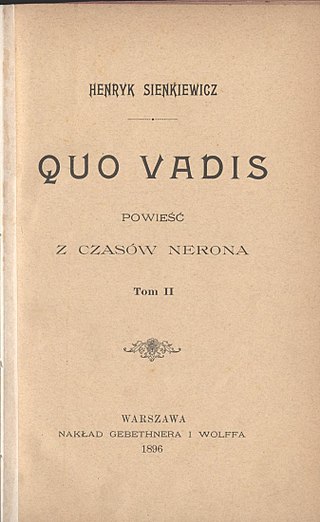
Quo Vadis: A Narrative of the Time of Nero is a historical novel written by Henryk Sienkiewicz in Polish.

Poppaea Sabina, also known as Ollia, was a Roman empress as the second wife of the emperor Nero. She had also been wife to the future emperor Otho. The historians of antiquity describe her as a beautiful woman who used intrigues to become empress.

The Crusades is a 1935 American historical adventure drama film directed and produced by Cecil B. DeMille for Paramount Pictures, loosely based on the life of King Richard I of England during the Third Crusade, and his marriage to Berengaria of Navarre. The film stars Henry Wilcoxon as Richard, Loretta Young as Berengaria, and Ian Keith as Saladin, along with C. Aubrey Smith, Katherine DeMille, Joseph Schildkraut and Alan Hale Sr. in supporting roles.
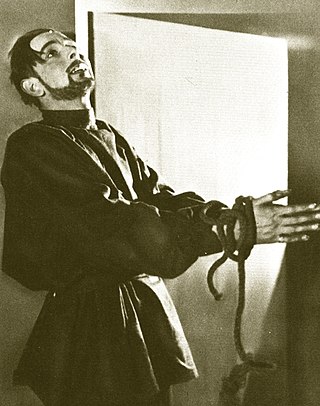
Arthur Hohl was an American stage and motion-picture character actor.
A.D. (1985) is an American/Italian miniseries in six parts which adapts the narrative in the Acts of the Apostles. Considered as the third and final installment in a TV miniseries trilogy which began with Moses the Lawgiver (1974) and Franco Zeffirelli's Jesus of Nazareth (1977), it was adapted from Anthony Burgess's 1985 novel The Kingdom of the Wicked, which was itself a sequel to Burgess's book Man of Nazareth, on which was based Zeffirelli's movie. The title is the abbreviation for Anno Domini, as the events occur in the first years of the Christian Era.
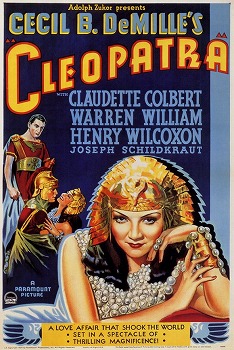
Cleopatra is a 1934 American epic film directed by Cecil B. DeMille and distributed by Paramount Pictures. A retelling of the story of Cleopatra VII of Egypt, the screenplay was written by Waldemar Young and Vincent Lawrence and was based on Bartlett Cormack's adaptation of historical material. Claudette Colbert stars as Cleopatra, Warren William as Julius Caesar, and Henry Wilcoxon as Mark Antony.
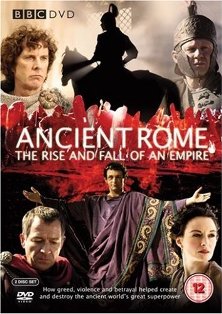
Ancient Rome: The Rise and Fall of an Empire is a 2006 BBC One docudrama series, with each episode looking at a different key turning point in the history of the Roman Republic and Empire. This docudrama focuses on the Latin western half of the Roman Empire.

Manslaughter is a 1930 American pre-Code drama film directed by George Abbott, and starring Claudette Colbert and Fredric March. An original print of the film is saved in the UCLA Film and Television Archive. This film is a sound remake of Cecil B. DeMille's 1922 silent classic Manslaughter. Paramount also released a French-language version of this 1930 film as The Indictment, directed by Dimitri Buchowetzki.

Four Frightened People is a 1934 American Pre-Code adventure film directed by Cecil B. DeMille and starring Claudette Colbert, Herbert Marshall, Mary Boland, and William Gargan. It is based on the 1931 novel by E. Arnot Robertson.
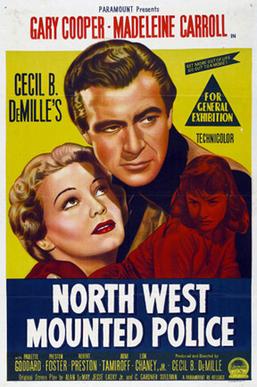
North West Mounted Police is a 1940 American epic north-western film produced and directed by Cecil B. DeMille and starring Gary Cooper and Madeleine Carroll. Written by Alan Le May, Jesse Lasky Jr., and C. Gardner Sullivan, and based on the 1938 novel The Royal Canadian Mounted Police by R. C. Fetherstonhaugh, the film is about a Texas Ranger who joins forces with the North-West Mounted Police to put down a rebellion in the north-west prairies of Canada. The supporting cast features Paulette Goddard, Preston Foster, Robert Preston, Akim Tamiroff, Lon Chaney Jr. and George Bancroft. Regis Toomey, Richard Denning, Rod Cameron, and Robert Ryan make brief appearances in the film playing small roles.

Quo Vadis is a 2001 Polish film directed by Jerzy Kawalerowicz based on the 1896 book of the same title by Henryk Sienkiewicz. It was Poland's submission to the 74th Academy Awards for the Academy Award for Best Foreign Language Film, but was not nominated.
The Sign of the Cross is an 1895 four-act historical tragedy, by Wilson Barrett and popular for several decades. Barrett said its Christian theme was his attempt to bridge the gap between Church and stage. The plot resembles that of Henryk Sienkiewicz's historical novel Quo Vadis, which was first published between 26 March 1895 and 29 February 1896 in the Gazeta Polska, 11 months after the play's first production.
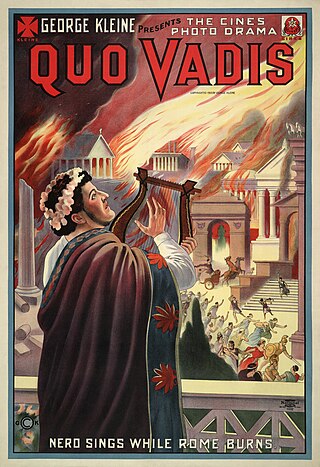
Quo Vadis is an Italian film directed by Enrico Guazzoni for Cines in 1913, based on the 1896 novel of the same name written by Henryk Sienkiewicz. It was one of the first blockbusters in the history of cinema, with 5,000 extras, lavish sets, and a lengthy running time of two hours, setting the standard for "superspectacles" for decades to come.
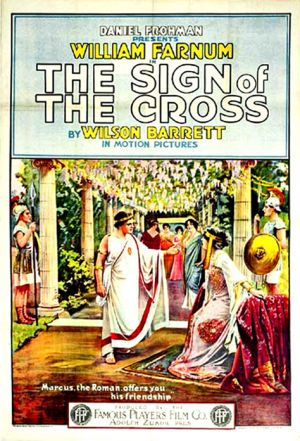
The Sign of the Cross is a 1914 American drama silent film directed by Frederick A. Thomson based on the 1895 play by Wilson Barrett. The film stars William Farnum, Rosina Henley, Sheridan Block, Morgan Thorpe, Ethel Grey Terry, Lila Barclay and George Majeroni. The film was released on December 21, 1914, by Paramount Pictures.





















